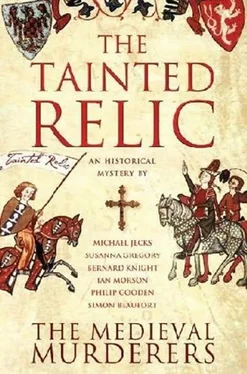‘Peace,’ he said shortly, and ushered her from the place. He closed the door and slid a heavy barrel in front of it to block it. There was no other entrance, nor a window. Satisfied, he drew his sword, wrapped his cloak about himself, and sat on the floor facing the door.
He was safe enough. God Himself was watching over him, and those whom He protected needed fear nothing from the maggots who inhabited this miserable world. His sword was dedicated to God’s service.
The dream came to him more often the older he grew, as though his heart were ensuring that his memories could not fade.
Baldwin de Furnshill was eighteen at the time, and the noise of the siege had never left him: the roars and shrieks of men, the thunder of massed kettledrums, the ringing clash of sword against scimitar, the appalling damp sucking sounds of weapons impaling bodies. All was terrifying.
He had sailed there full of hope. His stout English companions would soon put paid to these subhuman creatures with their dark skin and weird war cries. The ship’s master had told them of other glories, how English Crusaders had evicted the infidels before. Richard of England had come this way, he said, and pointed to an island to the north.
‘He took Cyprus, because the king of the island tried to ransom Richard’s fiancée and his sister. King Richard went through the place like a lance through butter, even though he had fewer men. That’s what you’ll do at Acre. Go at them and see them off.’
Setting foot on the harbour, Baldwin knew the ship’s master had been boosting their morale. He must have known that there was no chance of pilgrims defeating the army that encircled Acre. It was too vast.
They had arrived to find the city in flames. There was a thick pall of smoke over all, and as the English party left the ship, they stood awestruck. All about them was mayhem. Men shouting, women screaming, children wailing. A sudden thud made the ground quake, and Baldwin caught the eye of a man-at-arms who sat on a bale of cloth near by, nursing a stump where his arm had been.
‘They have a big bastard mangonel over there. Keep your head down or they’ll take it off.’
If at that moment Baldwin felt less certain that he and his comrades could turn the tide and rescue this city, he was soon to be convinced of the inevitability of their failure. It was later that first day, when he clambered up the walls.
Over the wide plain, shimmering in the heat, men moved like demonic ants. The distance made them seem tiny, but their numbers were appalling. Baldwin gaped at the sight, and the sense of fear that had first gripped him at the port now returned and seemed to clamp itself in his throat, making breathing difficult. He felt the sweat start from every pore and gazed about him with terror.
In all that horror, as the boulders pounded the walls and the defenders toppled all about, if there was one thing that maintained men’s sanity it was the Temple.
The Order’s building was at the south-western-most point of the city. It was a strong fortress, but the knights didn’t cower inside. Although the Temple was some distance from the battle, each day the Templars were in the thick of it. As the Moors attacked, Guillaume de Beaujeu, the Grand Master of the knights, would rush there with his men. They would enter the fray with their terrifying cries, the black and white Beauséant high over their heads, hacking and stabbing until the attempt was repulsed. Then they would hurry to the next fight, their resolution and determination a spur to all the defenders of that hellish place.
Then came a day of disaster.
A massive, crushing explosion, and Baldwin had to duck to avoid splinters of rock thrumming past. He was near the aptly named ‘Accursed Tower’, and the Moors were attacking at every point. Their siege ladders rose, hordes of screeching warriors clambering up the lower rungs before the steps were vertical; arrows pinged off masonry by Baldwin’s ear; slingshot bullets rattled from armour; yet over all the din of war he could hear the shrieks to his right. Glancing around, he realized with horror that the enemy had reached the tower and were barricading the doors against the city, preparing to create a sally-port in the heart of the city’s defences.
Baldwin pressed forward with others, but it was the Templars who stormed on through the massed bodies. Baldwin saw Guillaume de Beaujeu at the front, exhorting his men to greater efforts, and then he raised his arm, sword already bloody and smeared as though with a fine red oil, only to falter and disappear. The fighting grew more vicious, no quarter given on either side, and then Baldwin was struck a ringing blow on his helm which knocked him all but senseless. He was helped to safety by a weeping man.
‘I am all right,’ Baldwin gasped after a few moments. His head still rang, but the worst of the pain was already abating. He thanked his rescuer, but the fellow didn’t seem to hear. He was staring after a group walking away slowly, carrying a body.
‘Did you see it? Did you hear him? There’s no hope for us now.’
‘Who?’ Baldwin demanded.
‘Beaujeu! He said: “I can do no more. I am dead. See, my wound.”’ Suddenly the man sobbed. His beard was scorched away from one side of his face, the flesh raw from sunburn. He stared up and shook a fist skyward. ‘Christ in Heaven, why won’t you help us? We’re defending Your lands!’
‘Baldwin?’
The kick to his foot made him grunt with annoyance, but Baldwin opened one eye and peered upward without enthusiasm. ‘What do you want now? Can a man not enjoy a moment’s peace, Simon?’
His assailant was a tall, lean man in his mid-thirties. Simon Puttock had strong features. His face was sun-and wind-burned, and his hair was beginning to turn to grey at the temples, but for all that he looked like a man many years younger. His dark grey eyes held a mischievous amusement as he looked down on his friend.
For the last seven years this square-faced, rugged man had been bailiff at Lydford Castle, and the daily riding over the moors to negotiate with the miners of the Stannaries in their disputes with each other and with the local population had given him the leanness of a trained whippet. Now, however, he had been granted a new post by his master, Abbot Robert of Tavistock. He had become the abbot’s official as Keeper of the port of Dartmouth, a position that he found much less attractive.
‘The Keeper of the King’s Peace must be exhausted after too many strenuous days. Once upon a time he would have woken with the dawn.’
‘Some of us have to work for our living, Bailiff. I have sat and decided too many fates in the last few days to want to listen to chaff from lowly officials.’
‘Oho! Lowly, am I?’ Simon chuckled, and then reached for the blankets covering Baldwin’s body.
‘You forget yourself, Bailiff!’ Baldwin growled. ‘I am a Keeper of the King’s Peace and this week I am one of His Majesty’s Justices of Gaol Delivery. I have power of life and death, so do not vex me.’
‘I shouldn’t dream of it,’ Simon said innocently, choosing a stool and sitting near by.
Baldwin grunted, eyeing him doubtfully, a tall, broad and thickset man, running a little to fat now. He was over fifty years old, but the years had been kind. He had dark brown hair and eyes, and a beard that neatly followed the line of his jaw. Once, when Simon had first known him, that beard had been black, but now it was pickled and spotted with white. There were sparkles of white on his head, too, and Simon was suddenly aware that his companion was in fact an old man. It was an alarming realization. He had lost too many friends already, and the thought of losing Baldwin too was somehow sickening. He could feel a heaviness in the pit of his stomach at the mere idea.
Читать дальше












